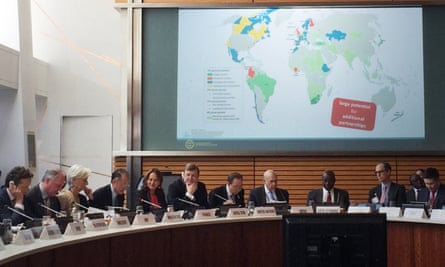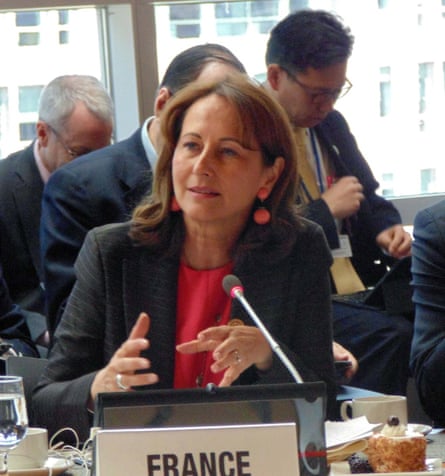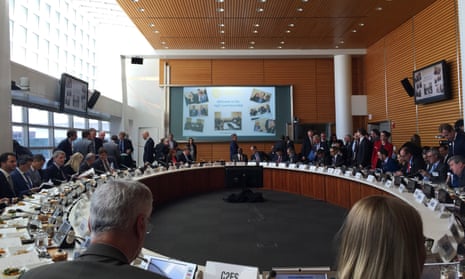Would it surprise you to learn that governments, oil companies, NGOs and major investors are coming together to map—and to motivate—the decarbonization of the global economy?
The Carbon Pricing Leadership Coalition (CPLC) is a policy-focused alliance of national and subnational governments, intergovernmental agencies, businesses and institutional investors, nonprofits and stakeholder networks. It was launched on the first day of the Paris climate negotiations, and its mission is simple: to collaborate across borders, across sectors, sharing information, know-how and capacity, to build the most economically efficient tools for decarbonization into every nation’s climate plan as soon as possible.

The Paris Agreement calls for non-state support for national climate action. The 17th Sustainable Development Goal is devoted to partnerships that build capacity and speed implementation. At the CPLC table, all of the partners are peers, and this takes the project well beyond the the conventions of global governance: honest and capable support for success is the shared focus, so governments and leading businesses work with intellectuals and policy advocates, to ensure no good thinking is left off the menu.
Asked why he sees this multi-sectoral collaboration as so crucial to success in combating climate change, World Bank President Jim Yong Kim said “Putting a price on carbon pollution will cut emissions, improve people’s health, and spur new investments in clean technology,” adding that success “will have a clear impact on our efforts to end extreme poverty in the world in 15 years.”
When Ethiopia’s Prime Minister Hailemariam Dessalegn joined the Carbon Pricing Panel last fall, he said his nation wanted to ensure it followed the most cost-effective route to leadership in the 21st century clean economy. Last week, he said he aims “to build a climate-resilient green middle-income economy.” Ethiopia will also produce “recommendations on the role and possible forms of carbon pricing policies in Ethiopia, which might also be applicable to similar low-income developing countries.”
On Friday, April 15, the CPLC held its first ever High-Level Assembly, a governance meeting bringing together leading diplomats, heads of government, and executive representation of all Coalition partners. Ségolène Royal, Minster of Environment for France, and Feike Sijbesma, CEO of Royal DSM, co-chaired the Assembly. They were joined by Dr. Kim, UN Secretary General Ban Ki-moon, IMF Managing Director Christine Lagarde, OECD Secretary General Angel Gurría, and Prime Minister Daniel Kablan Duncan of Côte d’Ivoire.
In her opening remarks to the inaugural governing Assembly, Minister Royal called for carbon pricing that is “high enough, significant enough to have a clear and rapid impact on various behaviors, namely on investment choices.” Royal, who is now also President of the Conference of the Parties to the UN Climate Convention, added that “This is the key element of the Paris Agreement.”

Specifically, Article 4 of the Paris Agreement calls on all nations to “promote environmental integrity, transparency, accuracy, completeness, comparability and consistency, and ensure the avoidance of double counting” in designing policy strategies that track, limit or eliminate carbon pollution. Article 6 outlines ways to transition market mechanisms developed under the Kyoto Protocol into a sharing of responsibility for climate action across borders, in fulfillment of new national climate action commitments.
As a venue to share policy aims, build new collaborative strategies, and work toward ensuring best practices are made available to all policy-makers, the CPLC has a real chance to ensure effective, efficient, and equitable strategies are part of every nation’s climate action agenda. Some approaches focus on covering one or more sectors of the economy—power generation, transport, agriculture. Others prioritize rewarding early actors while limiting emissions overall. But a simple fee applied to carbon-emitting fuels at the source with revenues recycled back into the economy can cover all sectors while adding day to day economic value at the human scale.
It is due to the already serious work being done between the CPLC partners that six heads of state, along with the leaders of the World Bank, IMF and OECD, were able to issue such a bold call to action on the day before the Paris Agreement was signed. Their Vision Statement calls for an expansion in carbon pricing policies from covering 12% of global greenhouse gas emissions now to 25% by 2020, then doubling again to 50%within ten years.
Those targets are the framing of a 10-year vision for broadening carbon pricing coverage, deepening carbon pricing where it exists, and expanding and enhancing international cooperation, through a well-designed, diverse, multisectoral coalition of working partners. This first-of-its-kind international policy collaboration is an effort to ensure we transition efficiently to climate-smart energy practices. No community should suffer the degradation brought on by pervasive climate disruption, and all nations can and should be part of a new and inclusive economy of sustainable shared prosperity.
Joseph Robertson is Global Strategy Director for the nonpartisan nonprofit organization Citizens’ Climate Lobby, and serves as CCL’s representative in Carbon Pricing Leadership Coalition meetings.

Comments (…)
Sign in or create your Guardian account to join the discussion